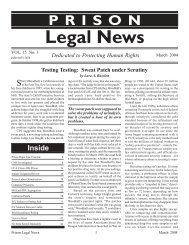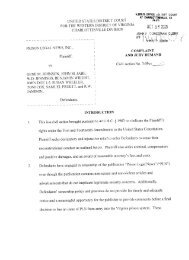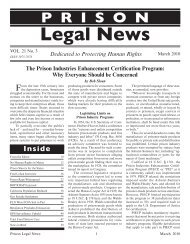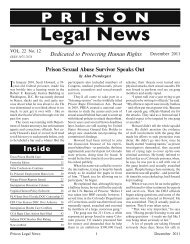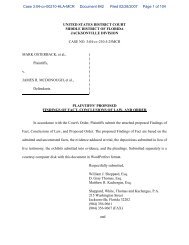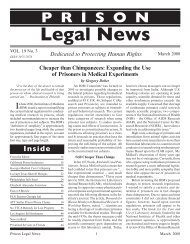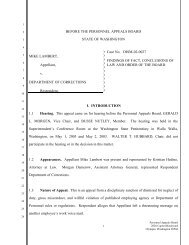From the Editor - Prison Legal News
From the Editor - Prison Legal News
From the Editor - Prison Legal News
You also want an ePaper? Increase the reach of your titles
YUMPU automatically turns print PDFs into web optimized ePapers that Google loves.
Michigan Counties Unsuccessful at Collecting Costs of Jail Imprisonment<br />
On September 12, 2007, <strong>the</strong><br />
Lenawee County Commission<br />
became embroiled in a debate over how to<br />
collect $6.3 million in outstanding “room<br />
and board” fees from former jail prisoners<br />
that had accrued over <strong>the</strong> past two fiscal<br />
years. The county charges $43.28 per jail<br />
day, but cuts that fee in half if <strong>the</strong> debt is<br />
paid within 30 days of release.<br />
What’s <strong>the</strong> problem? Start with <strong>the</strong> fact<br />
that it is generally poor people who spend<br />
time in jail ra<strong>the</strong>r than being released on<br />
bond or paying fines. Mix in <strong>the</strong> fact that<br />
jailing people is <strong>the</strong> perfect way for <strong>the</strong>m<br />
to lose <strong>the</strong>ir jobs, and a criminal record is<br />
a great method to keep <strong>the</strong>m from finding<br />
employment after <strong>the</strong>ir release. Factor in<br />
substantial court costs, fines and attorney<br />
fees, and it is evident to anyone who is not a<br />
Lenawee County Commissioner that most<br />
released prisoners are in no position to pay<br />
$43.28 per diem for back rent for time spent<br />
in <strong>the</strong> local lock-up.<br />
What’s <strong>the</strong> county’s solution to this<br />
pressing problem? Jail accounts clerk<br />
Sabrina Martinez has asked former prisoners<br />
to collect cans and bottles for <strong>the</strong><br />
10-cent deposit and use that money toward<br />
<strong>the</strong>ir jail bills. After all, we wouldn’t<br />
want ex-prisoners using such nickel-anddime<br />
income toward anything unessential<br />
– like food, clothing, housing, child care<br />
or medical treatment.<br />
Ano<strong>the</strong>r approach has been to turn<br />
<strong>the</strong> bills over to <strong>the</strong> Ann Arbor Credit<br />
Bureau (AACB), a collection agency that,<br />
with a five to seven percent collection rate,<br />
has double <strong>the</strong> success of <strong>the</strong> previous collection<br />
firm. Of course that is a very small<br />
rate of success, but who cares so long as<br />
some of <strong>the</strong> deadbeat former prisoners are<br />
made to pay. AACB also handles jail fee<br />
collections for Washtenaw County. <strong>From</strong><br />
1999 to 2003, approximately $23,600,000<br />
was billed to 13,800 former Washtenaw<br />
County prisoners. The amount collected<br />
during that time period was $231,437, or<br />
less than one percent.<br />
Lenawee County Commissioner<br />
Karol “K.Z.” Bolton suggested a work<br />
program for jail releasees to work off <strong>the</strong>ir<br />
debts through “volunteer” labor. Who<br />
would house and feed <strong>the</strong> “volunteer”<br />
work crew, what kind of work <strong>the</strong>y would<br />
do and potential liability issues were not<br />
addressed.<br />
Martinez suggested that allowing<br />
April 2008<br />
by Matt Clarke<br />
probation officers to accept minimal payments<br />
over a long period of time might<br />
work. “One guy took seven years to pay<br />
his bill, but he paid it,” she said. That’s<br />
a great way to save money. Keep former<br />
prisoners on probation – everyone knows<br />
that such supervision doesn’t cost <strong>the</strong> taxpayers<br />
anything – until <strong>the</strong> jail bill is paid<br />
at <strong>the</strong> rate of a few dollars a month.<br />
Commissioner Dick Bailey suggested<br />
in an angry tone that courts and police<br />
should be more selective – only jailing people<br />
with good credit ratings and incomes.<br />
Perhaps he was being sarcastic, or perhaps<br />
he just didn’t know what to do with poor<br />
people who are arrested and convicted.<br />
County Commissioner Jim VanDoren<br />
said <strong>the</strong> jail worked hard to collect on<br />
<strong>the</strong> bills and o<strong>the</strong>r counties were in much<br />
32<br />
worse shape. He suggested that state law<br />
be changed to allow court-ordered reimbursement<br />
of jail costs as a condition of<br />
probation. The state legislature has shown<br />
little interest in <strong>the</strong> suggestion. Maybe<br />
<strong>the</strong>y realize that, if faced with a non-paying<br />
probationer whose term of supervision<br />
was about to expire, <strong>the</strong>y would have to<br />
ei<strong>the</strong>r continue <strong>the</strong> probation until <strong>the</strong> bill<br />
was paid, costing <strong>the</strong> taxpayers additional<br />
money, or jail <strong>the</strong> person again, which<br />
would add to <strong>the</strong> bill.<br />
It’s a lose-lose situation that will<br />
probably never be resolved so long as<br />
government officials insist on extorting<br />
rent from <strong>the</strong>ir impoverished citizens for<br />
imprisoning <strong>the</strong>m.<br />
Source: Daily Telegram<br />
California’s Compassionate Release<br />
Law Expanded to Include <strong>the</strong><br />
Medically Incapacitated<br />
California’s compassionate release<br />
law, which already provided that<br />
prisoners who were physician-certified to<br />
have less than six months to live may apply<br />
for recall of sentence and release, was<br />
expanded to include those who are totally<br />
medically incapacitated. In addition, <strong>the</strong><br />
procedures to gain compassionate release<br />
were streamlined to speed up approvals.<br />
Assembly Bill (AB) 1539 was signed<br />
into law in October 2007, amending Penal<br />
Code § 1170(e) relating to <strong>the</strong> discretion<br />
vested in <strong>the</strong> secretary of corrections and<br />
<strong>the</strong> Board of Parole Hearings (BPH) to<br />
recommend a recall of sentence to <strong>the</strong><br />
sentencing court. § 1170(e)(2), which<br />
previously provided such discretion if<br />
(A) <strong>the</strong> prisoner is incurably terminally ill<br />
with less than six months to live and (B)<br />
<strong>the</strong> prisoner’s release conditions would<br />
not pose a threat to public safety, now<br />
offers, in lieu of (A), (C) <strong>the</strong> prisoner is<br />
so medically incapacitated that he/she is<br />
permanently unable to perform activities<br />
of daily living and requires 24-hour total<br />
care, such as being in a coma or vegetative<br />
state, brain-dead, or on a ventilator (and<br />
that <strong>the</strong>se conditions did not exist at <strong>the</strong><br />
time of sentencing). These provisions do<br />
not apply to prisoners sentenced to death<br />
or life without parole.<br />
O<strong>the</strong>r provisions of amended § 1170<br />
provide for procedures to gain such<br />
consideration. The court must give <strong>the</strong><br />
required hearing within ten days after a<br />
positive recommendation by prison or<br />
BPH authorities. Ano<strong>the</strong>r provision offers<br />
<strong>the</strong> prisoner’s family <strong>the</strong> chance to request<br />
such release directly of <strong>the</strong> prison’s Chief<br />
Medical Officer, who may <strong>the</strong>n recommend<br />
court proceedings. Also provided is<br />
that once approved by <strong>the</strong> court, <strong>the</strong> prisoner<br />
must be released within 48 hours, and<br />
shall have in <strong>the</strong>ir possession a discharge<br />
medical summary, full medical records,<br />
state identification, parole medications<br />
and all personal property.<br />
In o<strong>the</strong>r words, if you want to relieve<br />
<strong>the</strong> state of your medical costs and can<br />
afford private medical care, you may apply<br />
to stay in a coma someplace o<strong>the</strong>r<br />
than <strong>the</strong> prison hospital. It would seem<br />
<strong>the</strong> rare instance wherein a prisoner or<br />
his family could afford such 24-hour care,<br />
only to sustain such a dismal quality of<br />
life. And predictably, <strong>the</strong> “threat to public<br />
safety”provision will probably be used<br />
to engender denials based upon public<br />
outcry by victims’ rights groups and politicians.<br />
See: Assembly Pill 1539, Chapter<br />
740, California Legislative Counsel’s<br />
Digest, October 14, 2007.<br />
<strong>Prison</strong> <strong>Legal</strong> <strong>News</strong>



